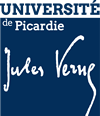Publications CORPUS 2014
Vous êtes ici : Accueil > Publications
 Catherine Douay et Daniel Roulland, Théorie de la relation interlocutive : sens, signe, réplication, Ed. Lambert-Lucas, 2014.
Catherine Douay et Daniel Roulland, Théorie de la relation interlocutive : sens, signe, réplication, Ed. Lambert-Lucas, 2014.La linguistique structurale a jusqu’à présent abandonné la communication à la pragmatique, ignorant ce que la théorie générale des systèmes démontre dans l’ensemble des sciences humaines, à savoir que tout système est un système de systèmes. L’ordre communicationnel est l’interaction « hologrammatique » (Edgar Morin) que ces systèmes établissent entre eux. On montre ici que la communication ne peut pas être réduite à un simple transfert d’information et que la linguistique structurale peut intégrer une science de l’interlocution qui déborde largement la pragmatique. Ce n’est qu’en apparence que les interlocuteurs sont usagers des structures : en réalité, ils forment un couple systémique qui ne peut pas ne pas communiquer. La théorie de la relation interlocutive qui en découle permet d’aborder sous un jour nouveau de nombreux problèmes grammaticaux du français et de l’anglais.
Commander l'ouvrage
Commander l'ouvrage
 Trevor Harris and Monia O’Brien Castro (eds), Preserving the Sixties: Britain and the ‘Decade of Protest’. Foreword by Dominic Sandbrook. Basingstoke: Palgrave Macmillan, 2014.
Trevor Harris and Monia O’Brien Castro (eds), Preserving the Sixties: Britain and the ‘Decade of Protest’. Foreword by Dominic Sandbrook. Basingstoke: Palgrave Macmillan, 2014.It is often claimed that the Sixties in Britain were dominated mainly by ‘youth’ and ‘protest’. True, the desire to escape outmoded social, moral and artistic conventions was illustrated in a rich, provocative cultural production, as well as through a number of radical social and political movements or reforms. However, as this collection argues, innovation was everywhere shadowed by conservatism. A decade fascinated by itself and, especially, by the future, was tormented by self-doubt and accompanied by a fear of losing the past. Ultimately the ‘radicalism’ of the Sixties in Britain is also visible in its conservatism, in the spectacular, novel ways in which the decade expressed and absorbed the new, yet preserved the old. Rather than pitting radical against conservative, the authors’ interpretation of the Sixties may well gain by attempting to see how these two apparently antagonistic qualities in fact represent opposite sides of the same problem.
Commander l'ouvrage Ariane Fenneteaux, Amélie Junqua and Sophie Vasset (eds.), The Afterlife of Used Things, Recycling in the Eighteenth Century, London, New York: Routledge, 2014.
Ariane Fenneteaux, Amélie Junqua and Sophie Vasset (eds.), The Afterlife of Used Things, Recycling in the Eighteenth Century, London, New York: Routledge, 2014.Recycling is not a concept that is usually applied to the eighteenth century. “The environment” may not have existed as a notion then, yet practices of re-use and transformation obviously shaped the early-modern world. Still, this period of booming commerce and exchange was also marked by scarcity and want. This book reveals the fascinating variety and ingenuity of recycling processes that may be observed in the commerce, crafts, literature, and medicine of the eighteenth century. Recycling is used as a thought-provoking means to revisit subjects such as consumption, the new science, or novel writing, and cast them in a new light where the waste of some becomes the luxury of others, clothes worn to rags are turned into paper and into books, and scientific breakthroughs are carried out in old kitchen pans.
Commander l'ouvrage Aurélie Thiria-Meulemans, Wordsworth et ses miroirs. Résonances des mythes d’Echo et de Narcisse, Grenoble : ELLUG, 2014.
Aurélie Thiria-Meulemans, Wordsworth et ses miroirs. Résonances des mythes d’Echo et de Narcisse, Grenoble : ELLUG, 2014.Wordsworth est-il le poète narcissique du « sublime égotiste » décrit par Keats ? L’étude approfondie de son œuvre révèle la présence, et le refoulement, du double mythe conté par Ovide au livre III des Métamorphoses. Le poète s’admire sans se l’avouer dans les lacs, les fleurs et les doubles rencontrés au gré des vers. Il se rêve également en Écho primitive, résonance fidèle du chant de la nature et non répétition des vers de ses prédécesseurs. Déplorant la perte de ses pouvoirs poétiques dans de nombreux poèmes et bien avant qu’elle n’intervienne effectivement, corrigeant toute son œuvre toute sa vie, pour adapter le miroir des vers à une réalité changeante, Wordsworth cherche par ailleurs à apprivoiser son lecteur, à faire de lui un double docile qui répèterait sans juger, à l’image du poète qui n’admire jamais rien tant que les vers qu’il ne comprend pas !
Commander l'ouvrage
